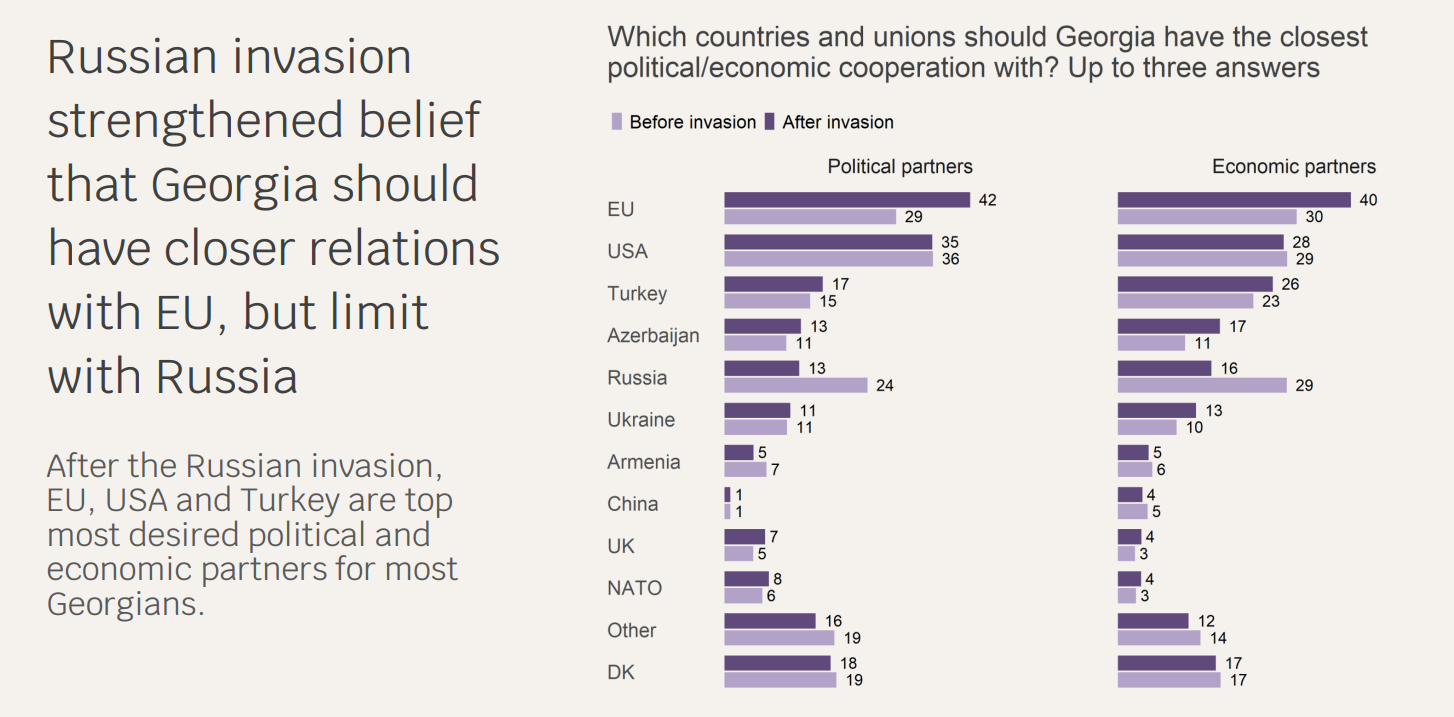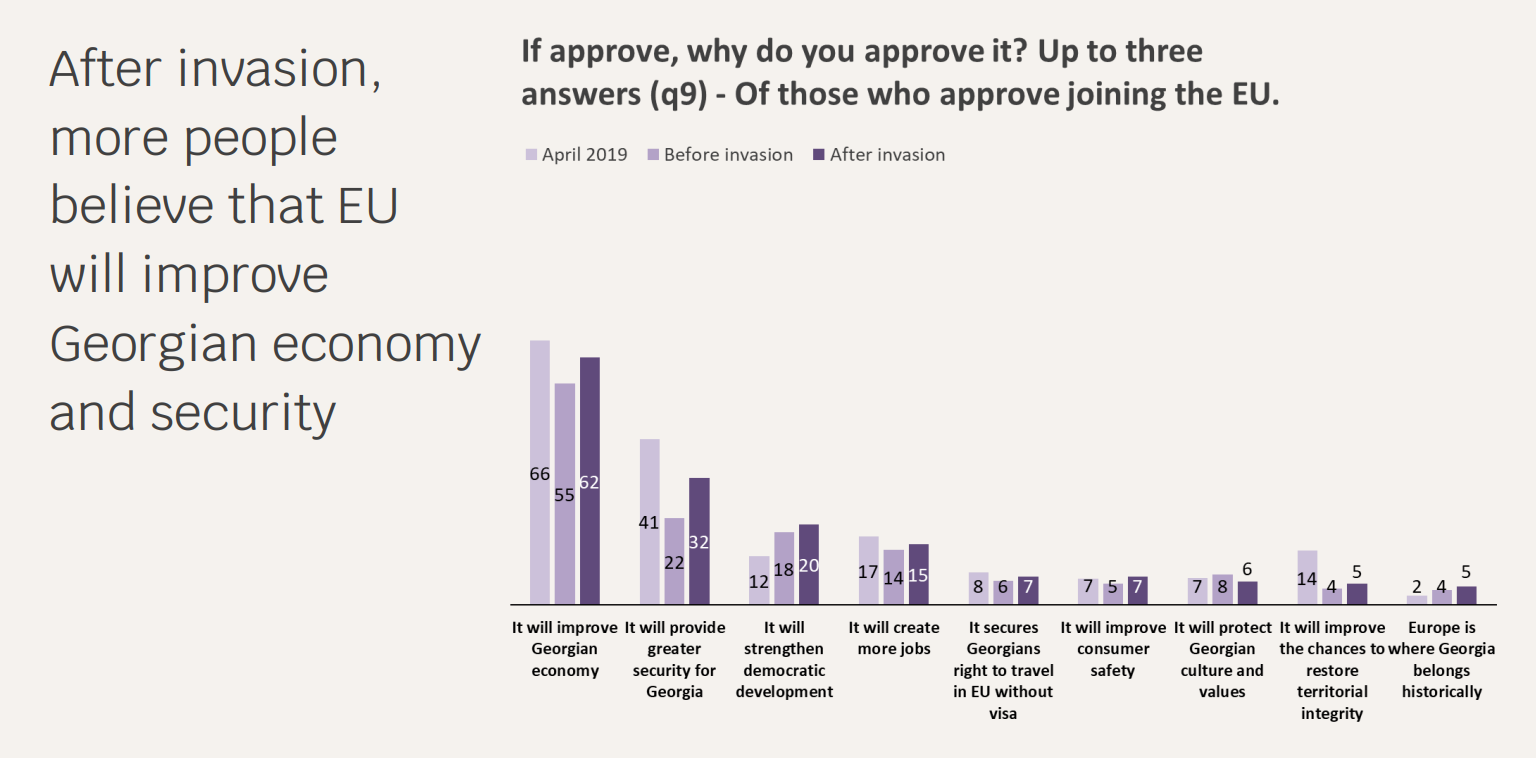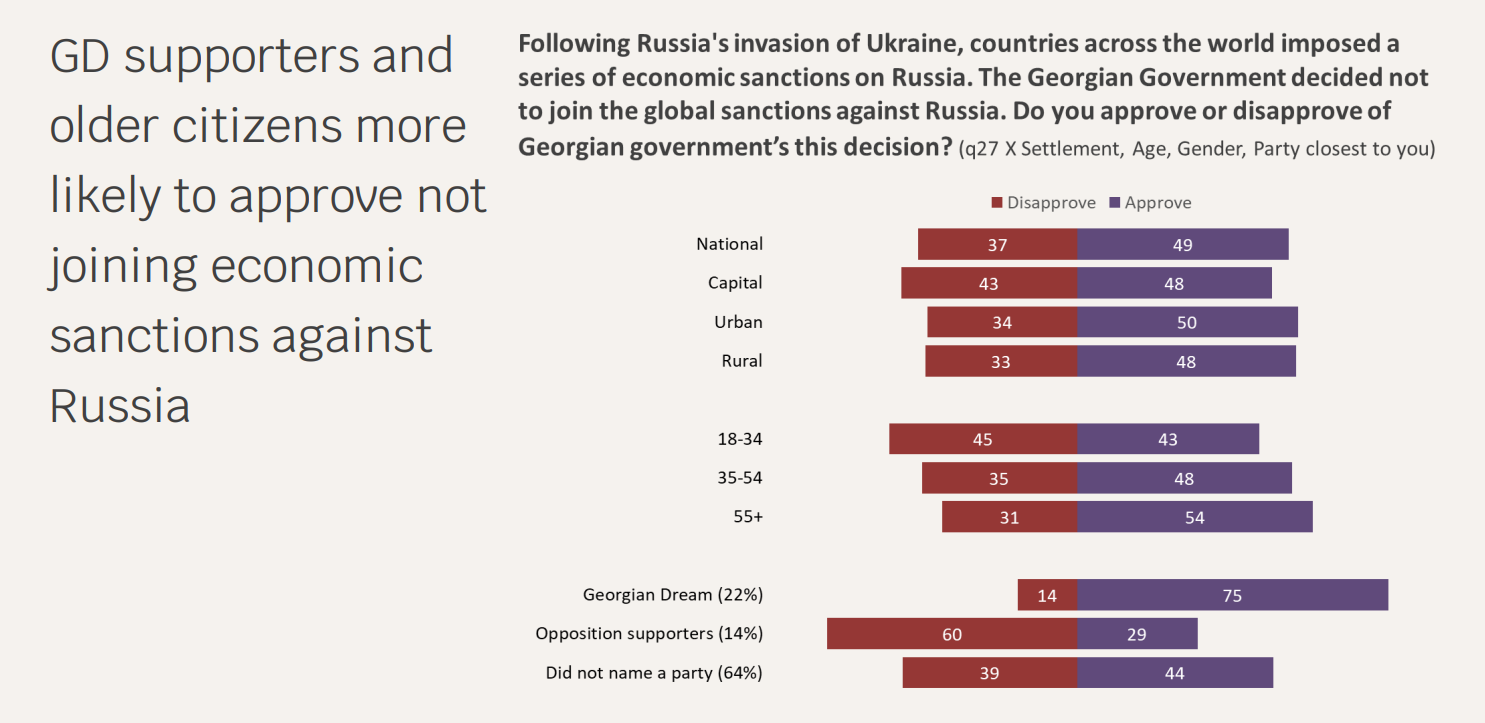New Poll Shows Key Public Attitude Shifts Amid Ukraine War
The invasion of Ukraine has amplified the Georgian public’s favorable views on closer ties with the EU and NATO as well as concerns over threats coming from Russia, findings of a new public opinion poll commissioned by the National Democratic Institute show.
The study, published today, was fielded by the Caucasus Research Resource Centers Georgia for NDI via polls between February 3 and 15, March 9 and 20, and focus groups between March 15 and 22.
The polls in February were carried out via phone interviews with 2,036 respondents, and in March with 2,024 respondents. The average margin of error was plus, minus 1.8% in February and 1.6% in March.
Meanwhile, the focus groups were conducted on the Zoom video conference platform, between March 15 and 22 in the cities of Tbilisi, Batumi, Telavi, Zugdidi, Akhalkalaki, and Marneuli. There were two groups in each city, 18-28 year-olds and those 45 and over.
Foreign Partners, European and Euro-Atlantic Integration
The study found that the Russian invasion has strengthened the belief that Georgia should seek closer ties with the EU and limit relations with Russia. While only 29% and 30% of the public said before the invasion that Georgia should have the closest political and economic ties, respectively, with the EU, the numbers spiked to 42% and 40% amid the war.
Meanwhile, the number of those who believed that Georgia should have the closest political and economic relations with Russia, plummeted from 24% and 29%, respectively, to 13% and 16%.
Against this backdrop, support for links with the U.S. remained practically unchanged.

The results of the survey also showed that while the number of Georgians who believe that Russian influence on the country has increased went up from 51% to 53%, the share of the population who hold the same view about NATO, U.S. and EU dropped from 25%, 31%, and 33%, to 17%, 25%, and 25%, respectively.
In this context also, 91% of those who think Russia’s sway has increased regard Russian influence as a “bad thing,” all the while EU, NATO, and U.S. influence enjoy favorable public attitudes.
As for EU membership, 82% of the public supported joining the 27-member-bloc in March, as opposed to 80% in February. Allowed to name three answers, those who support joining said it would improve the Georgian economy (62%), provide greater security (32%), and strengthen democratic development (20%).

The poll also found that support for NATO remains solid among the public, despite seeing a 3% decline from 74% before the invasion to 71% amid the war. Those who support joining the Alliance, when allowed to give three answers, said it would provide greater security to Georgia (53%), improve the country’s economy (37%), and improve chances to restore territorial integrity (27%).
While the number of those who approved of joining the EU and NATO increased from 65% to 69% following the invasion of Ukraine, the share of those who think abandoning the European and Euro-Atlantic integration course in favor of relations with Russia would be beneficial decreased from 18% to 10%.
Sanctions, attitudes toward Russia and Russians
Following the launch of the brutal invasion, 85% of the public believes that Russia is a “major threat” to neighbors, as opposed to 73% recorded ahead of the war. Meanwhile, 67% of Georgians blame the war on Russia, 11% on President Vladimir Putin, 9% on the U.S. and 5% on Ukraine.
Against this backdrop, 39% of Georgians argue the country should limit economic ties with Russia, up from 23% ahead of the war, while 25% advocate for deeper relations, down from 53%. 27% of the public believe Georgia should leave its economic links with Russia as they are, an 11% increase from 16% recorded in February.
Still, 49% of the respondents approve of the Georgian Dream Government’s rejection of imposing sanctions on Russia. 37% disapprove of the stance, while 14% do not know and 1% do not answer.
The study found that GD supporters and older citizens are more likely to approve of refraining from sanctions.

The study found that 98% of Georgians are overwhelmingly favorable toward the Ukrainian people and 87% also hold positive views of the Ukrainian Government.
Meanwhile, the Russian Government enjoys favorable attitudes from only 9% of the respondents. 85% of the interviewees hold an unfavorable view of the Kremlin, while 5% do not know. The picture is different when it concerns the public, as 59% of the respondents hold a favorable view of the Russian people, and 36% — an unfavorable one.
Georgian Dream supporters, men, those over 55 and rural residents are more likely to be more favorable toward Russians among their respective groups.

Still, the introduction of a visa regime for Russian nationals enjoys overwhelming support as 66% agree to it, 21% do not, 11% do not know and 1% refused to answer. GD supporters, men and older citizens are more against the introduction of a visa regime than others, the poll found.
81% of the respondents say the war will negatively affect their and their family’s economic well-being. Also, 80% say they expect an economic decline or hardship in the country amid the war in Ukraine, 57% say they anticipate the advancement of pro-Russian political powers, while 52% note they expect Russian military aggression against the country.
This post is also available in: ქართული (Georgian) Русский (Russian)